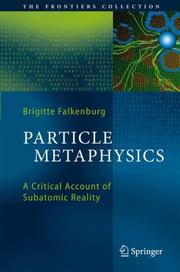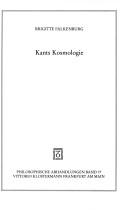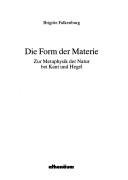| Listing 1 - 10 of 28 | << page >> |
Sort by
|

ISSN: 16123018 ISBN: 128081764X 9786610817641 3540337326 3540337318 3642070299 9783540337317 Year: 2007 Publisher: Berlin : Springer,
Abstract | Keywords | Export | Availability | Bookmark
 Loading...
Loading...Choose an application
- Reference Manager
- EndNote
- RefWorks (Direct export to RefWorks)
The empirical successes of atomic, nuclear, and particle physics have not reduced -- and may never fully resolve -- the philosophical controversies about the inner constitution of matter. This book examines these debates by exploring the particle concept in physics. Are the particles of modern physics "real" or are they fictitious entities, their existence deduced merely by the careless application of abstract theories? Or are the philosophers involved in the debate about "scientific realism" dedicating themselves to a problem that has long been solved by physicists? Studies of the experimental basis and theoretical relevance of the particle concept reveal that these questions are far from easy to answer, because, since the introduction of quantum theory, physical science no longer possesses a single unambiguous particle concept. All those interested in the "true meaning" of such physical concepts will find this book informative and thought provoking. It is written at a level accessible to scholars, students and teachers of science and philosophy.
Particles (Nuclear physics) --- Physics --- Realism. --- Reality. --- Philosophy. --- Philosophy --- Truth --- Nominalism --- Pluralism --- Pragmatism --- Empiricism --- Universals (Philosophy) --- Conceptualism --- Dualism --- Idealism --- Materialism --- Positivism --- Rationalism --- Elementary particles (Physics) --- High energy physics --- Nuclear particles --- Nucleons --- Nuclear physics --- Philosophy (General). --- Quantum theory. --- Particle and Nuclear Physics. --- Philosophy, general. --- Quantum Physics. --- Quantum dynamics --- Quantum mechanics --- Quantum physics --- Mechanics --- Thermodynamics --- Nuclear physics. --- Quantum physics. --- Mental philosophy --- Humanities --- Atomic nuclei --- Atoms, Nuclei of --- Nucleus of the atom --- Physics - Philosophy --- Reality --- Realism

ISBN: 3465030060 Year: 2000 Volume: 77 Publisher: Frankfurt am Main Vittorio Klostermann
Abstract | Keywords | Export | Availability | Bookmark
 Loading...
Loading...Choose an application
- Reference Manager
- EndNote
- RefWorks (Direct export to RefWorks)
Cosmology --- -Philosophy of nature --- -Nature --- Nature, Philosophy of --- Natural theology --- Astronomy --- Deism --- Metaphysics --- History --- -History --- -Philosophy --- Kant, Immanuel --- -Kant, Immanuel --- -Contributions in cosmology --- Contributions in philosophy of nature --- Philosophy of nature --- Nature --- Philosophy --- Kant, Immanuel, --- Kant, Emmanuel --- Kant, Emanuel --- Kant, Emanuele --- Views on space and time --- Contributions in cosmology --- 18th century --- Kant, I. --- Kānt, ʻAmmānūʼīl, --- Kant, Immanouel, --- Kant, Immanuil, --- Kʻantʻŭ, --- Kant, --- Kant, Emmanuel, --- Ḳanṭ, ʻImanuʼel, --- Kant, E., --- Kant, Emanuel, --- Cantơ, I., --- Kant, Emanuele, --- Kant, Im. --- קאנט --- קאנט, א. --- קאנט, עמנואל --- קאנט, עמנואל, --- קאנט, ע. --- קנט --- קנט, עמנואל --- קנט, עמנואל, --- كانت ، ايمانوئل --- كنت، إمانويل، --- カントイマニユエル, --- Kangde, --- 康德, --- Kanṭ, Īmānwīl, --- كانط، إيمانويل --- Kant, Manuel,

ISBN: 3610092114 9783610092115 Year: 1987 Volume: 238 Publisher: Frankfurt am Main Athenäum
Abstract | Keywords | Export | Availability | Bookmark
 Loading...
Loading...Choose an application
- Reference Manager
- EndNote
- RefWorks (Direct export to RefWorks)
Philosophy of nature --- History --- Hegel, Georg Wilhelm Friedrich, --- Kant, Immanuel, --- 117 --- -#GROL:SEMI-113<09> --- Nature --- Nature, Philosophy of --- Natural theology --- Materie. Oermaterie. Substantiële vorm --- Philosophy --- Hegel, Georg Wilhelm Friedrich --- -Kant, Immanuel --- -Contributions in philosophy of categories --- Contributions in philosophy of nature --- History. --- 117 Materie. Oermaterie. Substantiële vorm --- -Hegel, Giorgio Guglielmo Frederico --- Contributions in philosophy of categories --- #GROL:SEMI-113<09> --- Kant, Emmanuel --- Kant, Emanuel --- Kant, Emanuele --- Hegel, Giorgio Guglielmo Frederico --- Hegel, Georg Wilhelm Friedrich. --- Kant, Immanuel --- Kant, I. --- Kānt, ʻAmmānūʼīl, --- Kant, Immanouel, --- Kant, Immanuil, --- Kʻantʻŭ, --- Kant, --- Kant, Emmanuel, --- Ḳanṭ, ʻImanuʼel, --- Kant, E., --- Kant, Emanuel, --- Cantơ, I., --- Kant, Emanuele, --- Kant, Im. --- קאנט --- קאנט, א. --- קאנט, עמנואל --- קאנט, עמנואל, --- קאנט, ע. --- קנט --- קנט, עמנואל --- קנט, עמנואל, --- كانت ، ايمانوئل --- كنت، إمانويل، --- カントイマニユエル, --- Kangde, --- 康德, --- Kanṭ, Īmānwīl, --- كانط، إيمانويل --- Kant, Manuel, --- Hēgeru, --- Hei-ko-erh, --- Gegelʹ, Georg, --- Hījil, --- Khegel, --- Hegel, G. W. F. --- Hegel, --- Hei Ge Er, --- Chenkel, --- Hīghil, --- הגל, --- הגל, גאורג וילהלם פרידריך, --- הגל, גיאורג וילהלם פרידריך, --- הגל, ג.ו.פ, --- היגל, גורג ווילהלם פרדריך, --- היגל, גיורג וילהלם פרידריך, --- 黑格尔, --- Hegel, Guillermo Federico, --- Hegel, Jorge Guillermo Federico, --- Heyel, Georg Wilhelm Friedrich, --- Higil, Gʼūrg Vīlhim Frīdrīsh, --- هگل, --- هگل، گئورگ ويلهم فريدريش, --- Philosophy of nature - History --- Hegel, Georg Wilhelm Friedrich, - 1770-1831 --- Kant, Immanuel, - 1724-1804
Book
ISBN: 3030522903 303052289X Year: 2020 Publisher: Cham, Switzerland : Springer,
Abstract | Keywords | Export | Availability | Bookmark
 Loading...
Loading...Choose an application
- Reference Manager
- EndNote
- RefWorks (Direct export to RefWorks)
This book provides a comprehensive account of Kant’s development from the 1755/56 metaphysics to the cosmological antinomy of 1781. With the Theory of the Heavens (1755) and the Physical Monadology (1756), the young Kant had presented an ambitious approach to physical cosmology based on an atomistic theory of matter, which contributed to the foundations of an all-encompassing system of metaphysics. Why did he abandon this system in favor of his critical view that cosmology runs into an antinomy, according to the Critique of Pure Reason (CPR)? This book answers this question by focusing on Kant’s methodology and the internal problems of his 1755/56 theory of nature. A decisive role for Kant’s critical turn plays the argument from incongruent counterparts (1768), which drew much attention among philosophers of science, though not sufficiently in Kant research. Furthermore, the book analyses the genesis of the cosmological antinomy in the 1770s, the logical structure of the antinomy in the CPR, its relation to transcendental idealism, as explained in the “experiment of pure reason” (1787), and its role for the teleology of human reason. The book is addressed to Kant scholars, philosophers of science, and students of Kant’s philosophy.
Philosophy and science. --- Metaphysics. --- Philosophy of nature. --- Biology—Philosophy. --- Philosophy of Science. --- Philosophy of Nature. --- Philosophy of Biology. --- Nature --- Nature, Philosophy of --- Natural theology --- Philosophy --- God --- Ontology --- Philosophy of mind --- Science and philosophy --- Science --- Cosmology --- Philosophy. --- Kant, Immanuel, --- Kant, Immanuel --- Kant, I. --- Kānt, ʻAmmānūʼīl, --- Kant, Immanouel, --- Kant, Immanuil, --- Kʻantʻŭ, --- Kant, --- Kant, Emmanuel, --- Ḳanṭ, ʻImanuʼel, --- Kant, E., --- Kant, Emanuel, --- Cantơ, I., --- Kant, Emanuele, --- Kant, Im. --- קאנט --- קאנט, א. --- קאנט, עמנואל --- קאנט, עמנואל, --- קאנט, ע. --- קנט --- קנט, עמנואל --- קנט, עמנואל, --- كانت ، ايمانوئل --- كنت، إمانويل، --- カントイマニユエル, --- Kangde, --- 康德, --- Kanṭ, Īmānwīl, --- كانط، إيمانويل --- Kant, Manuel,
Digital
ISBN: 9783540337324 Year: 2007 Publisher: Berlin, Heidelberg Springer-Verlag Berlin Heidelberg
Abstract | Keywords | Export | Availability | Bookmark
 Loading...
Loading...Choose an application
- Reference Manager
- EndNote
- RefWorks (Direct export to RefWorks)
Philosophy --- Metaphysics --- Quantum mechanics. Quantumfield theory --- Elementary particles --- elementaire deeltjes --- quantumfysica --- filosofie --- metafysica
Multi
ISBN: 9783030522902 Year: 2020 Publisher: Cham Springer International Publishing
Abstract | Keywords | Export | Availability | Bookmark
 Loading...
Loading...Choose an application
- Reference Manager
- EndNote
- RefWorks (Direct export to RefWorks)
This book provides a comprehensive account of Kant’s development from the 1755/56 metaphysics to the cosmological antinomy of 1781. With the Theory of the Heavens (1755) and the Physical Monadology (1756), the young Kant had presented an ambitious approach to physical cosmology based on an atomistic theory of matter, which contributed to the foundations of an all-encompassing system of metaphysics. Why did he abandon this system in favor of his critical view that cosmology runs into an antinomy, according to the Critique of Pure Reason (CPR)? This book answers this question by focusing on Kant’s methodology and the internal problems of his 1755/56 theory of nature. A decisive role for Kant’s critical turn plays the argument from incongruent counterparts (1768), which drew much attention among philosophers of science, though not sufficiently in Kant research. Furthermore, the book analyses the genesis of the cosmological antinomy in the 1770s, the logical structure of the antinomy in the CPR, its relation to transcendental idealism, as explained in the “experiment of pure reason” (1787), and its role for the teleology of human reason. The book is addressed to Kant scholars, philosophers of science, and students of Kant’s philosophy.
Philosophy --- Metaphysics --- Philosophy of nature --- Philosophy of science --- Biology --- biologie --- filosofie --- wetenschapsfilosofie --- metafysica
Book
ISBN: 1280786329 9786613696717 364225098X Year: 2012 Publisher: Berlin/Heidelberg : Springer,
Abstract | Keywords | Export | Availability | Bookmark
 Loading...
Loading...Choose an application
- Reference Manager
- EndNote
- RefWorks (Direct export to RefWorks)
Aus der Sicht der Neurobiologie regiert im Kopf das neuronale Geschehen. Doch was wissen die Hirnforscher genau über die Mechanismen des Hirngeschehens und ihren Einfluss auf den menschlichen Geist? Dieser Frage geht Brigitte Falkenburg nach. Die Physik hat sich längst vom mechanistischen Weltbild gelöst, in der Neurobiologie bleiben überholte mechanistische Vorstellungen bis heute wirksam. Dabei sind die "mechanistischen" Erklärungen der Hirnforschung ganz anders als ihr Name suggeriert; und wer annimmt, der Geist sei so strukturiert wie die Materie, zieht atomistische und kausale Fehlschlüsse über das Bewusstsein. Falkenburgs Buch möchte die Debatte um Geist und Gehirn, freien Willen und Determinismus endlich davon befreien. Es liefert Grundzüge einer Wissenschaftstheorie der Hirnforschung und eröffnet den Weg zu einem differenzierteren Naturverständnis und Menschenbild.
Philosophy. --- Neurobiology. --- Biophysics. --- Biological physics. --- Ethics. --- Popular Science in Philosophy. --- Philosophy of Man. --- Biological and Medical Physics, Biophysics. --- Neurology.
Book
ISBN: 9783030522896 Year: 2020 Publisher: New York, NY : Springer International Publishing,
Abstract | Keywords | Export | Availability | Bookmark
 Loading...
Loading...Choose an application
- Reference Manager
- EndNote
- RefWorks (Direct export to RefWorks)
This book provides a comprehensive account of Kant's development from the 1755/56 metaphysics to the cosmological antinomy of 1781. With the Theory of the Heavens (1755) and the Physical Monadology (1756), the young Kant had presented an ambitious approach to physical cosmology based on an atomistic theory of matter, which contributed to the foundations of an all-encompassing system of metaphysics. Why did he abandon this system in favor of his critical view that cosmology runs into an antinomy, according to the Critique of Pure Reason (CPR) ? This book answers this question by focusing on Kant's methodology and the internal problems of his 1755/56 theory of nature. A decisive role for Kant's critical turn plays the argument from incongruent counterparts (1768), which drew much attention among philosophers of science, though not sufficiently in Kant research. Furthermore, the book analyses the genesis of the cosmological antinomy in the 1770s, the logical structure of the antinomy in the CPR , its relation to transcendental idealism, as explained in the "experiment of pure reason" (1787), and its role for the teleology of human reason. The book is addressed to Kant scholars, philosophers of science, and students of Kant's philosophy.
Book
ISBN: 9783662439111 3662439107 9783662439104 3662439115 Year: 2015 Publisher: Berlin, Heidelberg : Springer Berlin Heidelberg : Imprint: Springer,
Abstract | Keywords | Export | Availability | Bookmark
 Loading...
Loading...Choose an application
- Reference Manager
- EndNote
- RefWorks (Direct export to RefWorks)
The physics of condensed matter, in contrast to quantum physics or cosmology, is not traditionally associated with deep philosophical questions. However, as science - largely thanks to more powerful computers - becomes capable of analysing and modelling ever more complex many-body systems, basic questions of philosophical relevance arise. Questions about the emergence of structure, the nature of cooperative behaviour, the implications of the second law, the quantum-classical transition and many other issues. This book is a collection of essays by leading physicists and philosophers. Each investigates one or more of these issues, making use of examples from modern condensed matter research. Physicists and philosophers alike will find surprising and stimulating ideas in these pages.
Physics. --- Condensed Matter Physics. --- Philosophy of Science. --- History and Philosophical Foundations of Physics. --- Statistical Physics, Dynamical Systems and Complexity. --- Science --- Physique --- Sciences --- Philosophy. --- Philosophie --- Physics --- Condensed matter --- Philosophy --- Condensed matter -- Mathematical models. --- Physics -- Philosophy. --- Physical Sciences & Mathematics --- Atomic Physics --- Mathematical models. --- Condensed materials --- Condensed media --- Condensed phase --- Materials, Condensed --- Media, Condensed --- Phase, Condensed --- Philosophy and science. --- Condensed matter. --- Statistical physics. --- Dynamical systems. --- Liquids --- Matter --- Solids --- Complex Systems. --- Statistical Physics and Dynamical Systems. --- Mathematical statistics --- Normal science --- Philosophy of science --- Statistical methods --- Dynamical systems --- Kinetics --- Mathematics --- Mechanics, Analytic --- Force and energy --- Mechanics --- Statics --- Natural philosophy --- Philosophy, Natural --- Physical sciences --- Dynamics --- Science and philosophy --- Physics - Philosophy. --- Science - Philosophy --- Condensed matter - Philosophy
Book
ISBN: 3030107078 303010706X Year: 2019 Publisher: Cham : Springer International Publishing : Imprint: Springer,
Abstract | Keywords | Export | Availability | Bookmark
 Loading...
Loading...Choose an application
- Reference Manager
- EndNote
- RefWorks (Direct export to RefWorks)
This volume offers a broad, philosophical discussion on mechanical explanations. Coverage ranges from historical approaches and general questions to physics and higher-level sciences . The contributors also consider the topics of complexity, emergence, and reduction. Mechanistic explanations detail how certain properties of a whole stem from the causal activities of its parts. This kind of explanation is in particular employed in explanatory models of the behavior of complex systems. Often used in biology and neuroscience, mechanistic explanation models have been often overlooked in the philosophy of physics. The authors correct this surprising neglect. They trace these models back to their origins in physics. The papers present a comprehensive historical, methodological, and problem-oriented investigation. The contributors also investigate the conditions for using models of mechanistic explanations in physics. The last papers make the bridge from physics to economics, the theory of complex systems and computer science . This book will appeal to graduate students and researchers with an interest in the philosophy of science, scientific explanation, complex systems, models of explanation in physics higher level sciences, and causal mechanisms in science.
Mathematics-Philosophy. --- Mechanics. --- Mechanics, applied. --- Philosophy (General). --- Computer science. --- Philosophy of Mathematics. --- Classical Mechanics. --- Theoretical and Applied Mechanics. --- History of Philosophy. --- Mathematics of Computing. --- Informatics --- Science --- Applied mechanics --- Engineering, Mechanical --- Engineering mathematics --- Classical mechanics --- Newtonian mechanics --- Physics --- Dynamics --- Quantum theory --- Mathematics—Philosophy. --- Mechanics, Applied. --- Philosophy. --- Computer science—Mathematics. --- Mental philosophy --- Humanities
| Listing 1 - 10 of 28 | << page >> |
Sort by
|

 Search
Search Feedback
Feedback About UniCat
About UniCat  Help
Help News
News